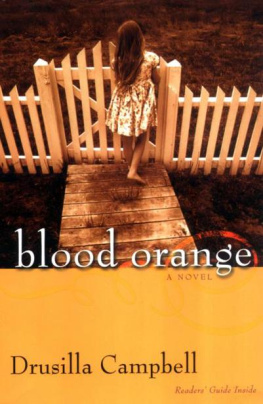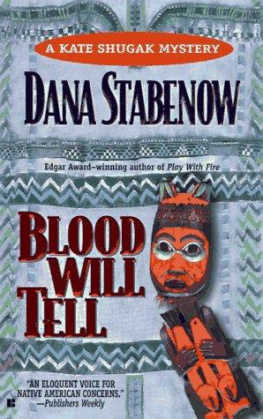



For Margaret Ellen
 n the back of my garden a blood orange tree struggles for life. Its effort to be fruitful against the odds touches my heart. Valiant and struggling maybe thats me Im describing: Dana Cabot struggling to be better. But there is nothing valiant in me. I have proved myself a liar and coward too many times to have illusions.
n the back of my garden a blood orange tree struggles for life. Its effort to be fruitful against the odds touches my heart. Valiant and struggling maybe thats me Im describing: Dana Cabot struggling to be better. But there is nothing valiant in me. I have proved myself a liar and coward too many times to have illusions.
Does this explain why I take the time to fertilize and prune and mulch my little tree when everything else in the garden must hobble along as best it can? Having failed myself and others, I want and need to prove I can do better.
In its protected corner my gawky blood orange grows slowly. In a year or two, if all goes well, it may bear fruit. Perhaps then we will all have healed. I long for that day, for summertime, a girls voice, and the raspberry sweetness of the blood red fruit.
September
 ana Cabot stood in the doorway to the undercroft holding a pastry box full of twenty-six dollars worth of still-warm croissants. How typically Episcopalian to use the medieval word undercroft to designate what was essentially a basement consisting of one large room and five smaller ones connected by a narrow hallway. The walls of the undercroft were covered with Sunday school bulletin boards and pictures of Jesus as infant, boy, and man. And photos of Bailey Cabot.
ana Cabot stood in the doorway to the undercroft holding a pastry box full of twenty-six dollars worth of still-warm croissants. How typically Episcopalian to use the medieval word undercroft to designate what was essentially a basement consisting of one large room and five smaller ones connected by a narrow hallway. The walls of the undercroft were covered with Sunday school bulletin boards and pictures of Jesus as infant, boy, and man. And photos of Bailey Cabot.
HAVE YOU SEEN THIS LITTLE GIRL?
Seven-year-old Bailey Cabot was abducted from her home on May 29, 2004. At the time she wore a pink and lime green dotted Swiss dress. Baileys hair is light brown, her eyes are brown, and shes four feet, one inch tall.
Red and green sticky circles dotted the maps of southern California and western Arizona that were stuck to the walls with strips of masking tape. Green meant the county had been leafleted; red indicated a Bailey task force had been started in one or more church congregations. Lutherans and Presbyterians, Methodists and Unitarians had all become involved. Yellow circles showed that thousands of ID photos of Bailey had been distributed all over California, Arizona, and Nevada. On a map of the United States blue circles indicated an e-mail campaign underway from San Diego to Vermont.
A three-page article had appeared in People magazine: HAVE YOU SEEN BAILEY CABOT?
There could be no one left in the United States who had not heard that Bailey Cabot had been stolen from behind her own front door. If it were propaganda, Dana thought, wed have won the war by now.
Instead of circles on the maps, Dana wished the committee had used stars like those Bailey showed off on the work she brought home from Phillips Academy. The stars were a code that had been explained to the parents in a special letter mailed from the principals office: a single star meant good effort, and all the children got that, no matter what; two meant progress; three were cause for a celebration. No one celebrated circles; circles went nowhere, and only emphasized the futility and frustration of the search for Bailey that had started in one place, gone all around the world, and ended up right back where it started, with a big zero. Circles meant nothing; circles were holes to fall into. Dana wanted constellations like the Big Dipper, Orion, and the reliable North Star pointing the way to Bailey.
Danas hands began to shake. Beth Gordon strode across the room and took the box from her.
These are going to be appreciated.
Dana looked at the empty room and wondered by whom.
How could she not have foreseen what had to happen eventu ally, that the women and men who had come forth immediately and with such optimism would eventually grow tired of spending their days in a gloomy basement pretending their cause was not a hole in the ground. She did not blame the others for giving up. She herself wanted to give up sometimes.
Even her husband, David, when he talked about Bailey, had begun to get a discouraged sideways look around his eyes. As much as she wanted to talk about this with him, she could not make herself ask the question. Will we ever find her? All their years together they had been each others support and encouragement. When Davids professional football career was over, she told him he would ace the California bar and be another kind of star. Her Ph.D. efforts dragged on and on, but he told her she was brilliant anyway. And when doctors said there was something wrong with Baileys mind, they had held each other up. It was the way their marriage had worked until Bailey vanished. For comfort and support they were no good to each other now.
For a few weeks she had attended a support group for the families of children who had disappeared. As if agony could be slotted into an appointment book, the group had met every Tuesday night at seven in a church basement virtually indistinguishable from the undercroft. On a table to one side of the circled chairs, coffee and tea and some kind of cake or cookies were set out. Dana remembered the hum of the air conditioner and the almost constant sound of bodies shifting on the uncomfortable metal chairs. Heavy sighs, the rustle of clothing and scuffle of shoes on the linoleum floor. No one was at ease in that room. No one wanted to be there. Mothers and fathers, boyfriends, grandparents, everyone either overweight or way too thin, the jittery eyes Morse coding the need for a smoke: they all had stories. Their children had vanished from highway rest stops, shopping malls, on the way to school. Ordinary children, not one of them spectacular in any way. Little boys in OshKosh BGosh overalls with tape on the temples of their small eyeglasses. Girls in school uniforms or cutoffs, their hair in ponytails or curly or cut short and straight with bangs that hung down over their eyebrows. Dana saw there was an epidemic, a virus of vanishment running through the cities and suburbs of America, with hardly a family left uninfected. Support group was a misnomer. The sad faces and stories only deepened Danas misery and fed the rage she struggled to suppress.
She was not a quitter. Her emotions never got the better of her good sense. She was stubborn and dogged once she set her mind on something. These were traits that had served her well and brought her far from her beginnings. But sometimes she wished she had been made differently.






















 n the back of my garden a blood orange tree struggles for life. Its effort to be fruitful against the odds touches my heart. Valiant and struggling maybe thats me Im describing: Dana Cabot struggling to be better. But there is nothing valiant in me. I have proved myself a liar and coward too many times to have illusions.
n the back of my garden a blood orange tree struggles for life. Its effort to be fruitful against the odds touches my heart. Valiant and struggling maybe thats me Im describing: Dana Cabot struggling to be better. But there is nothing valiant in me. I have proved myself a liar and coward too many times to have illusions.
 ana Cabot stood in the doorway to the undercroft holding a pastry box full of twenty-six dollars worth of still-warm croissants. How typically Episcopalian to use the medieval word undercroft to designate what was essentially a basement consisting of one large room and five smaller ones connected by a narrow hallway. The walls of the undercroft were covered with Sunday school bulletin boards and pictures of Jesus as infant, boy, and man. And photos of Bailey Cabot.
ana Cabot stood in the doorway to the undercroft holding a pastry box full of twenty-six dollars worth of still-warm croissants. How typically Episcopalian to use the medieval word undercroft to designate what was essentially a basement consisting of one large room and five smaller ones connected by a narrow hallway. The walls of the undercroft were covered with Sunday school bulletin boards and pictures of Jesus as infant, boy, and man. And photos of Bailey Cabot.